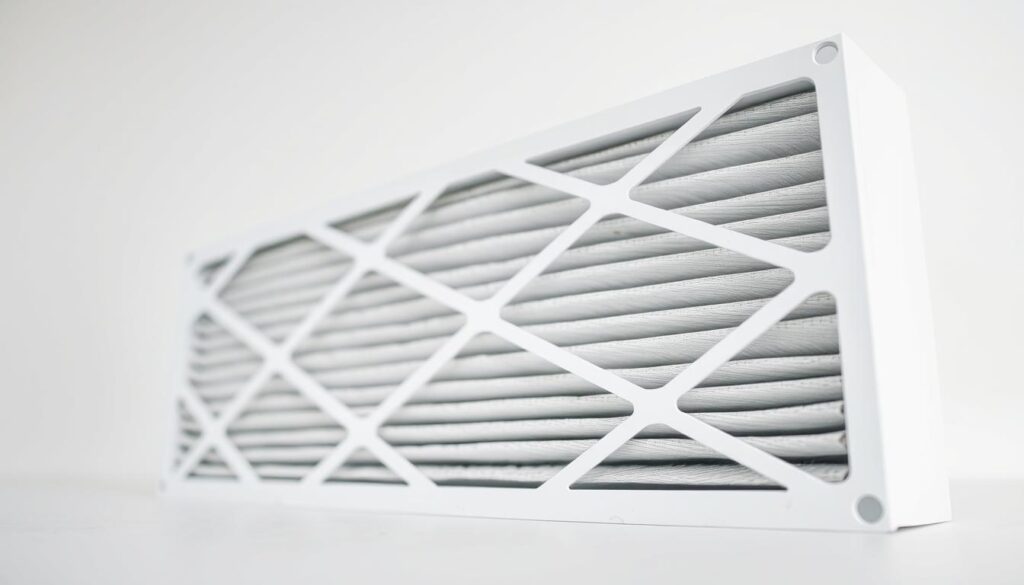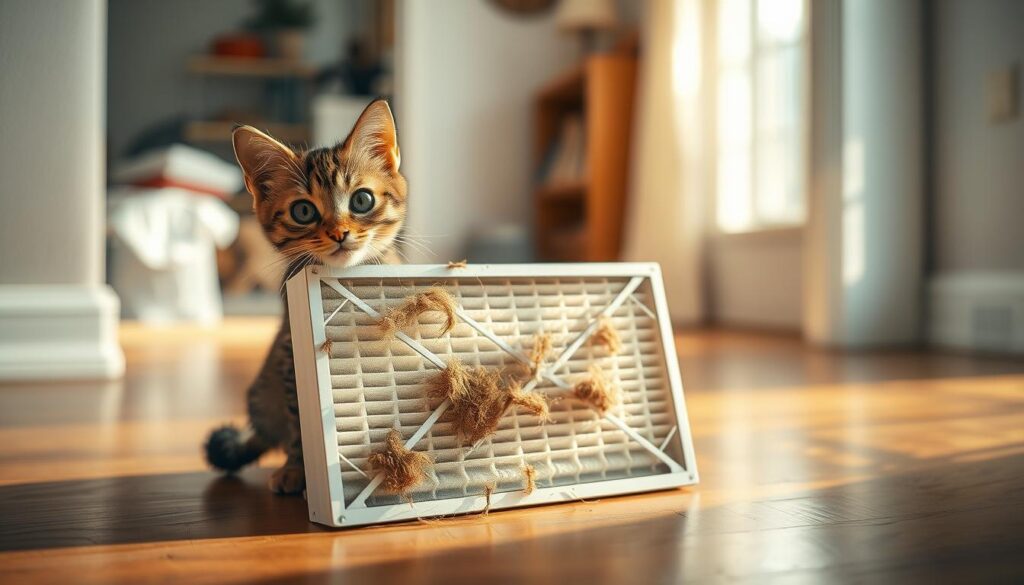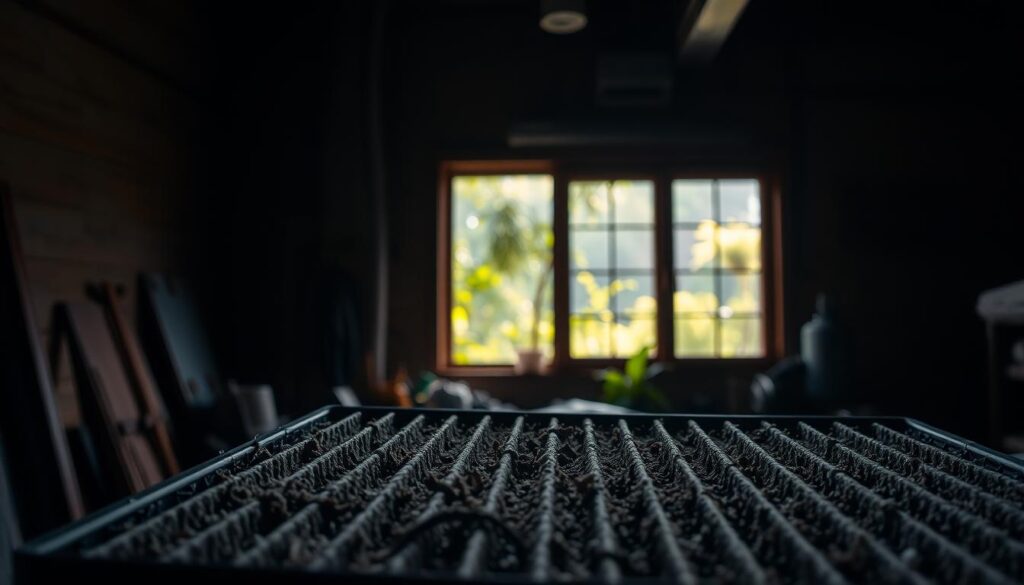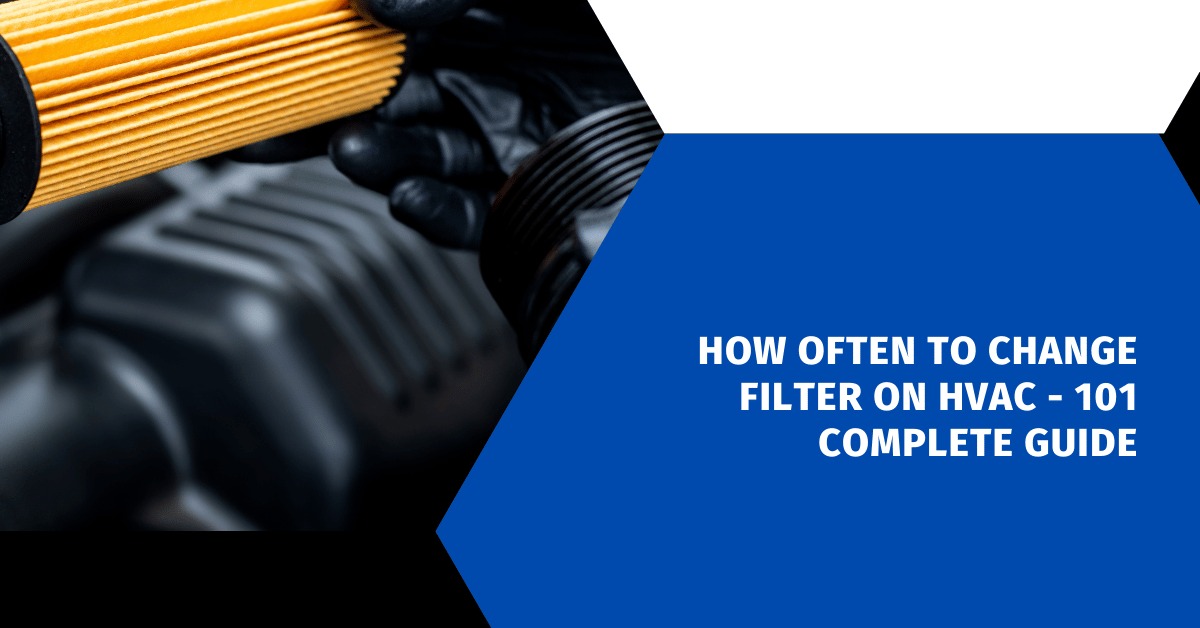Affiliate Disclosure
HVAC Guide Guys is a participant in the Amazon Services LLC Associates Program, an affiliate advertising program designed to provide a means for sites to earn advertising fees by advertising and linking to Amazon.
How Often to Change Filter on HVAC? Are you unknowingly compromising your home’s air quality and HVAC system performance? Knowing when to change your HVAC filter is key to a healthy, efficient home.

HVAC filters keep your indoor air clean, protecting against dust, allergens, and pollutants. Keeping them clean and replacing them on time is essential for your comfort and system efficiency.
This guide will cover everything about when to replace your HVAC filter. You’ll learn how to spot the right time and understand what affects your filter’s life. You’ll get expert tips to keep your HVAC system in top shape.
Key Takeaways
- Regular HVAC filter replacement prevents system inefficiency
- Filter change frequency depends on multiple environmental factors
- Clean filters improve indoor air quality and reduce energy costs
- Different filter types require varying replacement schedules
- Professional maintenance can extend HVAC system life
Table of Contents
Understanding HVAC Filter Basics and Their Importance
Your HVAC system’s heart is its filter. It’s a key part that keeps your home’s air clean and your system working well. These filters work hard to catch bad particles and keep your indoor air healthy.
HVAC filters are special screens that catch bad stuff as air moves through your heating and cooling system. It’s important to keep up with air filter maintenance. This helps keep your home’s air clean and your HVAC system running smoothly.
What Is an HVAC Filter
An HVAC filter acts as a shield against dust, pollen, pet dander, and tiny particles. These filters are made of different materials and designs. Each one is good at catching different sizes of airborne dirt.
- Prevents large particles from damaging system components
- Improves indoor air quality
- Reduces possible respiratory irritants
Why Regular Filter Maintenance Matters
Ignoring your hvac system filter can cause big problems. Dirty filters make your system work harder, use more energy, and run less efficiently. Regular maintenance stops expensive repairs and keeps your system running well.
Impact on System Performance
Clean filters mean better air flow, less energy use, and longer equipment life. By keeping your filters clean, you’re not just improving the air. You’re also protecting your HVAC investment and making your home healthier.
Clean filters = Efficient HVAC system + Healthier Air
Different Types of HVAC Filters and Their Lifespan
Choosing the right HVAC filter is key for clean air. Your home’s air system uses various filters, each with its own strengths and weaknesses.
Filter Varieties Explained
HVAC filters fall into main categories, each for different air quality needs. Knowing these options helps you pick the best filter for your home.
- Fiberglass Filters: Budget-friendly but less effective
- Pleated Filters: Higher efficiency with longer lifespan
- Washable Filters: Reusable option for eco-conscious homeowners
Choosing the right filter depends on your home’s needs and air quality concerns.
| Filter Type | Efficiency | Typical Lifespan | Cost Range |
|---|---|---|---|
| Fiberglass | Low | 30 days | $1-$3 |
| Pleated | Medium to High | 60-90 days | $5-$15 |
| Washable | Low to Medium | 6-12 months | $15-$30 |
Your air quality plan should consider filter type, home environment, and filtration needs. Higher MERV-rated filters offer better protection but may need more frequent changes.
Explore Our HVAC Shop
Looking for top-rated HVAC tools, parts, and accessories? Visit our shop and find the perfect solution for your needs.
Visit the ShopKey Factors Affecting Filter Change Frequency
Knowing what affects your HVAC filter’s life is key. It helps prevent clogs and keeps your filter working well. Several things decide how often you’ll need to change your air filter.
Important factors influence your filter’s performance and when you need to replace it:
- Home Size and Layout: Bigger homes with complex air flow need filters changed more often
- Indoor Air Quality: Places with lots of dust, pet hair, or pollutants need filters changed more often
- Seasonal Variations: Each season brings different air quality challenges for your HVAC system
Home Size and Layout Considerations
Your home’s size and design affect how often you’ll need to change filters. Open floor plans with less clutter help air flow better. But, homes with many levels or rooms might have harder air flow.
Air Quality Conditions
Both indoor and outdoor air quality impact your filter. Homes near construction, in cities, or with pets will need filters changed more often. Dust, pollen, and tiny particles build up fast, making filters wear out quicker.
Seasonal Changes
Seasons change bring different challenges for HVAC systems. Summer’s humidity and winter’s dry air can wear out filters faster. Keeping track of these changes helps prevent clogs and keeps your system running well.
Pro Tip: Regular monitoring and proactive filter maintenance can significantly extend your HVAC unit’s lifespan and improve overall air quality.
How Often to Change Filter on HVAC
Finding the right time to change your HVAC filter can be hard. Your home’s conditions are key to figuring this out. It’s not just about following general advice. Knowing your specific needs helps keep your air clean and your system running well.
When deciding how often to change your filter, consider a few important things:
- Standard 1-3 inch filters: Replace every 30-90 days
- 4-inch filters: Replace every 6-9 months
- 5-inch filters: Replace every 9-12 months
Every home is different, so the filter change schedule varies. Here’s a closer look at when you might need to change your filter:
| Home Environment | Recommended Replacement Frequency |
|---|---|
| Single-person household, no pets | Every 6-12 months |
| Multiple occupants or pets | Every 30-60 days |
| Homes with allergies or respiratory issues | Every 30-45 days |
| Homes near construction or high pollution | Every 20-45 days |
Looking at your filter is the best way to know when to change it. Check your filter monthly and look for visible dust, debris, and discoloration. If it looks gray or is full of dirt, it’s time for a new one.
Pro tip: Set a calendar reminder to inspect your HVAC filter regularly and track its condition.
Keep in mind, these are just suggestions. Your home’s environment, air quality, and how much you use your HVAC system will affect the best time to change your filter.
Understanding MERV Ratings and Filter Efficiency
When it comes to keeping your air clean, knowing about MERV ratings is key. MERV stands for Minimum Efficiency Reporting Value. It shows how well a filter catches different sized particles.
MERV ratings go from 1 to 16. Each number shows how good a filter is at catching tiny particles. The higher the MERV rating, the better it is at cleaning your air.
Decoding MERV Rating Levels
- MERV 1-4: Basic filtration, captures large particles
- MERV 5-8: Medium efficiency, traps dust and pollen
- MERV 9-12: High efficiency, captures microscopic allergens
- MERV 13-16: Superior filtration, ideal for sensitive environments
Selecting the Right MERV Rating
Choosing the right filter change intervals depends on your needs. Higher MERV ratings mean better air quality but can also slow down your HVAC system.
For most homes, MERV ratings between 8 and 13 are a good choice. They balance air quality and system performance well. If you have allergies or pets, you might want a higher MERV rating. But always check what your HVAC maker suggests.
Explore Our HVAC Shop
Looking for top-rated HVAC tools, parts, and accessories? Visit our shop and find the perfect solution for your needs.
Visit the ShopImpact of Pets and Occupants on Filter Life

Your home’s inhabitants greatly affect your hvac system filter’s lifespan. Pets and people can cause filters to wear out faster and lower air quality. Regular maintenance is key to stop hvac filter clogs.
Pet owners face special challenges with HVAC filters. Dogs, cats, and other pets release dander, hair, and tiny particles. These particles quickly build up in your filter, making your HVAC system work harder. This can shorten the filter’s life and reduce its effectiveness.
- Large dogs shed more hair, increasing filter stress
- Multiple pets multiply filter contamination
- Long-haired animals create more filter buildup
The number of people in your home also affects filter performance. Larger families create more dust, dirt, and airborne particles. Each person adds to the filter’s workload, meaning you’ll need to replace it more often.
Proactive filter maintenance is key to maintaining optimal indoor air quality and system efficiency.
Here are some tips for homes with pets and many people:
- Check filters monthly
- Replace filters every 60-90 days
- Use high-quality filters with higher MERV ratings
- Groom pets regularly to reduce airborne hair
Strategic filter management helps protect your HVAC system and maintains a cleaner, healthier home environment.
Signs Your HVAC Filter Needs Immediate Replacement
Knowing when to replace your HVAC filter is key for keeping your system running well. Spotting early signs can help avoid big problems. It also keeps your heating and cooling system from getting too stressed.
Visual Inspection Guidelines
A simple look can tell you a lot about your filter’s state. Here are some tips for checking your air filter:
- Hold the filter up to a light source
- Check if light passes through the filter material
- Examine the color and buildup of dust and debris
“A clean filter should allow light to pass through. If it looks completely dark or blocked, it’s time for hvac filter cleaning vs replacement.” – HVAC Maintenance Experts
Performance Indicators
Your HVAC system tells you when it needs a new filter through several signs:
- Reduced airflow from vents
- Uneven heating or cooling in your home
- Increased dust on surfaces
- Unusual noises from the HVAC system
Energy Bill Changes
A dirty filter can really raise your energy costs. Look out for big jumps in your utility bills. This could mean your filter needs to be replaced.
By keeping up with filter maintenance, you can keep your system running smoothly. This improves air quality indoors and can save you money on energy and repairs.
Explore Our HVAC Shop
Looking for top-rated HVAC tools, parts, and accessories? Visit our shop and find the perfect solution for your needs.
Visit the ShopMaintaining Air Quality for Allergy Sufferers
Allergy sufferers have special challenges with indoor air quality. Your HVAC system is key in managing allergens and making your home comfortable. Keeping your HVAC system well-maintained can greatly lessen allergy symptoms and boost home comfort.
Choosing the right air filter is vital for allergy relief. High-efficiency filters with higher MERV ratings catch more tiny particles that cause allergies. Here are tips for changing filters at the right time:
- Use HEPA-grade filters that capture 99.97% of airborne particles
- Replace filters every 60-90 days for allergy sufferers
- Change them more often during high pollen seasons
Your home’s indoor environment greatly affects allergy management. Dust mites, pet dander, and seasonal pollens can build up fast. Regular filter maintenance is key. People with respiratory sensitivities should watch their HVAC system’s air filtration closely.
Clean air isn’t a luxury—it’s a necessity for allergy sufferers.
Keep an eye on your filter’s performance by looking for dust buildup and any rise in allergy symptoms. A clean, well-kept HVAC system can cut down indoor allergens and make your home healthier.
Environmental Factors and Filter Replacement
Your HVAC system’s filter lifespan isn’t just about what’s inside. External factors also play a big role. They help decide when you need to replace your filter.

Outdoor Air Quality Challenges
Environmental conditions outside can really affect your HVAC filter. Places with lots of pollution, areas near wildfires, or zones near industrial sites need filters changed more often.
- High pollution areas may reduce filter effectiveness by 30-40%
- Wildfire seasons can clog filters faster than normal conditions
- Dusty or construction-heavy neighborhoods increase filter replacement frequency
Seasonal Filter Maintenance
Seasonal changes can really impact your HVAC system. They affect how well it works and how often you need to change the filter.
- Spring: Increased pollen requires more frequent filter checks
- Summer: Higher humidity can accelerate filter degradation
- Fall: Increased debris and leaf particles impact filter performance
- Winter: Indoor air becomes more concentrated, stressing filters
Knowing about these seasonal changes can help you keep your HVAC system running well. You can also keep the air inside your home clean all year round.
Cost Considerations and Filter Maintenance
Understanding the costs of HVAC filter maintenance is key to smart home decisions. The Department of Energy says a clean filter can make your system 5-15% more efficient. This means big savings on energy.
Your air filter schedule is vital for both short and long-term costs. Regular changes avoid expensive repairs and make your HVAC last longer.
- Basic disposable filters cost $5-$10 per unit
- Advanced pleated filters range from $15-$40
- High-efficiency filters can cost up to $100
When thinking about when to replace your hvac filter, remember these important points:
- Energy Efficiency: Clean filters use less energy
- System Longevity: Proper care avoids costly repairs
- Air Quality: Regular changes improve indoor air
While it might seem like a cost upfront, timely filter replacements save money. They prevent big HVAC problems and lower your energy bills.
Explore Our HVAC Shop
Looking for top-rated HVAC tools, parts, and accessories? Visit our shop and find the perfect solution for your needs.
Visit the ShopProfessional Recommendations for Filter Care
Keeping your HVAC system running well needs expert advice on filter care. HVAC pros share tips on how to make filters last longer and keep your system working great.
Filter care is more than just changing them out. Experts suggest a smart way to clean or replace filters. This can save you money and make the air cleaner.
Expert Tips for Extended Filter Life
- Check filters every month for dirt and dust
- Choose high-quality filters with the right MERV ratings
- Keep the area around filters clean to prevent contamination
- Stick to a regular maintenance routine
“Regular filter maintenance is the key to long-term HVAC system health and efficiency.” – HVAC Professional Association
Maintenance Schedule Best Practices
| Filter Type | Recommended Replacement/Cleaning | Special Considerations |
|---|---|---|
| Fiberglass Filters | Every 30 days | Lowest cost, minimal filtration |
| Pleated Filters | Every 60-90 days | Better air quality protection |
| Washable Filters | Clean every 3-4 months | Reusable with proper maintenance |
When to clean or replace filters depends on their state. Disposable filters are usually cleaner when replaced. Washable filters need gentle cleaning and must dry completely before use.
Talking to a professional HVAC technician can give you advice that fits your home and system.
Conclusion
Knowing when to change your HVAC filter is key to a healthy home. Your HVAC system affects your indoor air and energy use. By following this guide, you can keep your system running well and your family healthy.
Every home is different, and so is its filter needs. Things like pets and local air quality matter. Regular checks and timely replacements keep your system working right and save you money.
Filter care is an investment in your home’s comfort and health. Changing filters often keeps the air clean and saves energy. Make it a habit to check your filters and stick to a routine that fits your home.
This guide has given you the tools to care for your HVAC system. Your efforts will lead to cleaner air, lower bills, and a cozy home. Stay on top of your system’s needs for a better living space.

